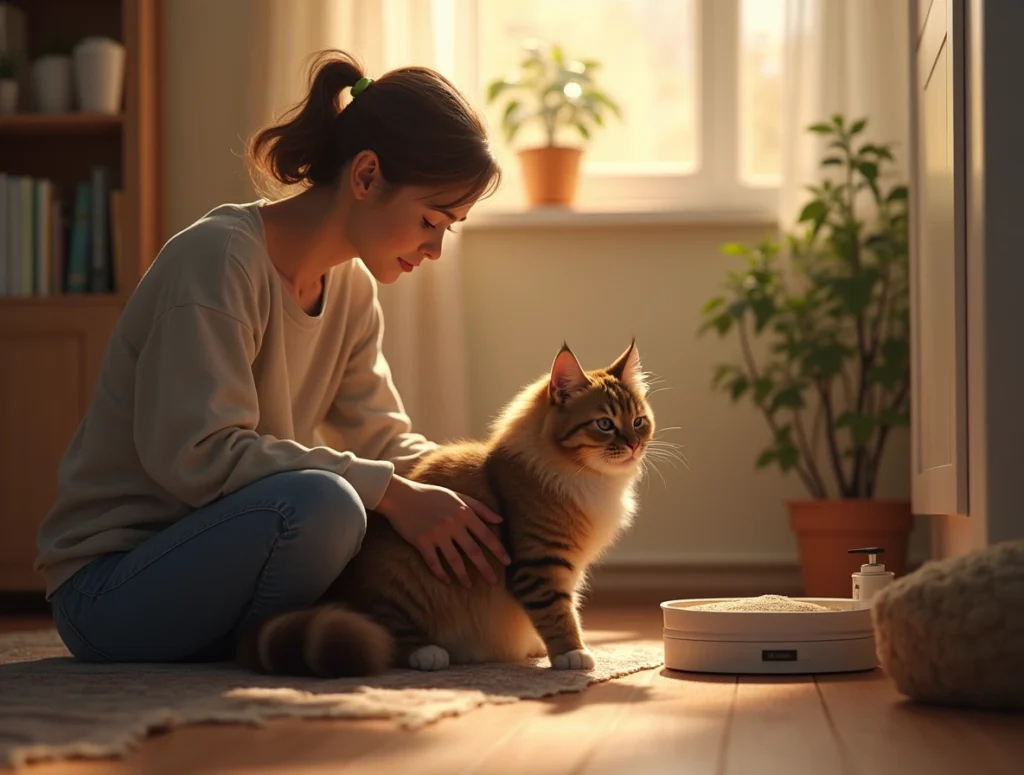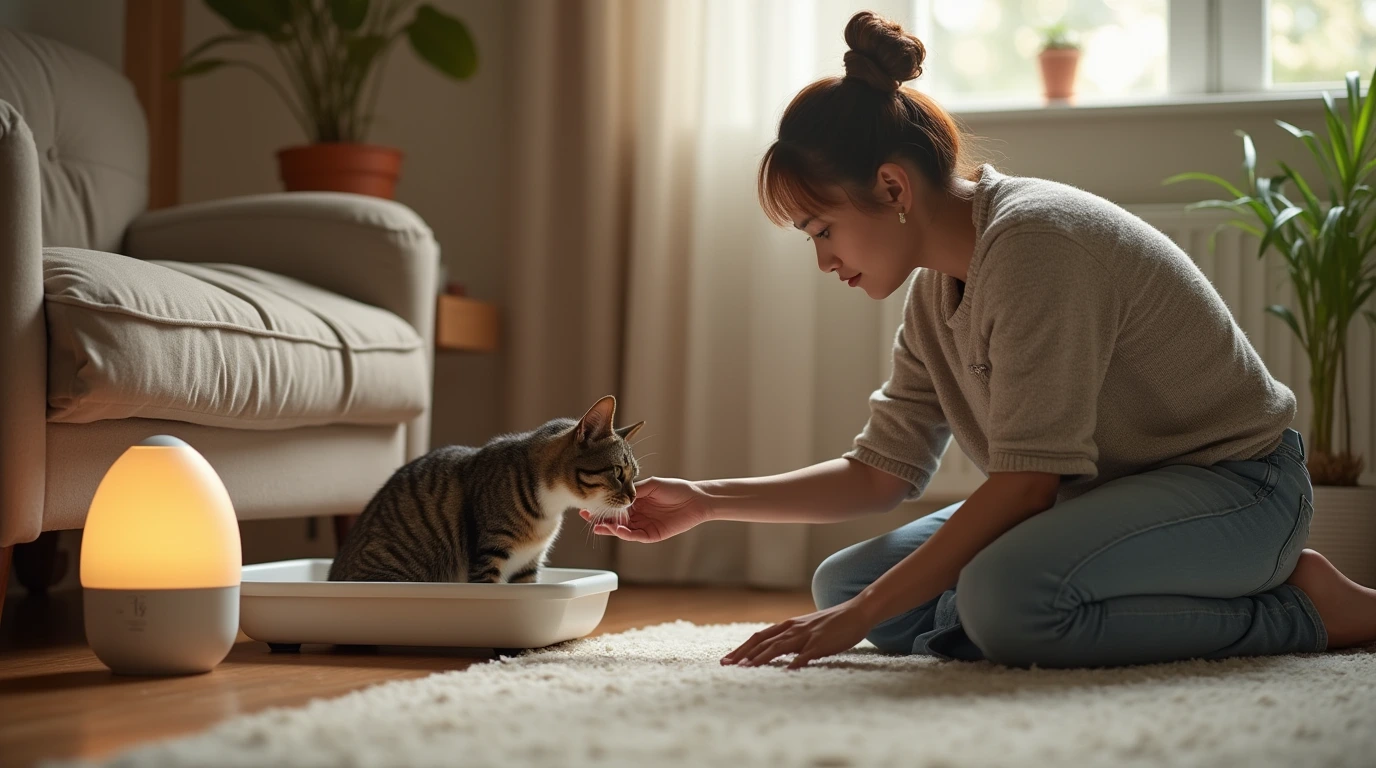Why Is My Cat Pooping Outside the Litter Box? Causes and Solutions
Table of Contents
Coming home to discover that your beloved cat has chosen to go outside the litter box can feel both confusing and frustrating. You might find yourself wondering, “Why is this happening?” or “Am I doing something wrong?” Rest assured, your cat isn’t acting out of spite or rebellion. When a cat avoids the litter box, it’s often a signal that something deeper is going on. It could be a medical issue causing them discomfort, an emotional reaction to stress, or dissatisfaction with their environment. The good news is that with understanding, patience, and the right steps, you can address the problem effectively.
Your cat’s behavior is their way of communicating that something needs attention. By recognizing the signs and identifying the root cause, you’re already taking the first steps toward restoring peace and cleanliness in your home. Whether it’s a simple change in their litter box setup, a need for stress relief, or medical care, there are solutions to help your cat feel secure and comfortable again.
In this article, we’ll delve into the common causes behind this behavior and provide practical, actionable solutions to guide your feline friend back to using their litter box with confidence and ease.

Common Causes of Cat Pooping Outside the Litter Box
Understanding why your cat is avoiding the litter box is the crucial first step to solving the problem. Cats thrive on routine and familiarity, so any disruption in their environment or daily habits can result in changes to their behavior. While it may seem frustrating, your cat isn’t being spiteful—this behavior is often their way of signaling that something isn’t right.
Common causes for litter box avoidance can range from medical issues, such as urinary tract infections or digestive problems, to emotional stress brought on by changes like a new pet, household moves, or even loud noises. Environmental factors, such as an unclean litter box or an unsuitable location, can also play a significant role.
By identifying the root cause, you can tailor a solution that addresses your cat’s specific needs, ensuring they feel comfortable and confident using the litter box once more.
Medical Issues
Your cat might be dealing with a health problem that makes using the litter box difficult or painful. Medical conditions are a common reason for litter box avoidance, and understanding these can help you address the issue effectively.
- Urinary tract infections (UTIs): These can cause pain and discomfort, leading to accidents outside the litter box.
- Constipation or diarrhea: Digestive problems may make it challenging for your cat to control their bowel movements, causing unexpected messes.
- Arthritis: Older cats with joint pain might struggle to climb into a litter box, especially one with high sides.
What You Can Do: If your cat suddenly stops using the litter box, schedule a visit to the veterinarian as soon as possible. A thorough examination can identify underlying health issues, allowing your vet to recommend treatments such as medications, dietary changes, or modifications to the litter box to accommodate your cat’s needs.
If your cat suddenly starts pooping outside the litter box, schedule a vet visit. A thorough check-up will help rule out or address any medical issues.
Stress and Anxiety
Cats are sensitive creatures that thrive on routine and stability. Even small changes in their environment can cause stress, which may lead to behavioral changes like avoiding the litter box. Major disruptions, such as moving to a new home, introducing another pet, or loud and persistent noises, can make your cat feel uneasy or threatened. Stress can manifest in various ways, often signaling that your feline friend is struggling to cope.
Signs of Stress in Cats:
- Excessive grooming or over-grooming, leading to bald spots.
- Hiding for extended periods or acting withdrawn.
- Unexplained aggression toward other pets or even family members.
- Loss of appetite or changes in normal routines.
How to Help:
To support your stressed cat, create a calm and secure environment. Designate a quiet space where they can retreat when overwhelmed. Gradually introduce any changes, such as a new pet, allowing them time to adjust at their own pace. Stick to consistent feeding and play schedules to restore a sense of normalcy. Additionally, consider using calming products like pheromone sprays or diffusers, which mimic natural scents that promote relaxation. With patience and care, your cat can regain their confidence and return to healthy litter box habits.
Litter Box Problems
Believe it or not, the issue might be with the litter box itself. Cats are particular about their restroom habits, and any dissatisfaction can lead them to avoid the box entirely.
Common Litter Box Issues:
- Location problems: The box might be too close to a noisy area, too far away, or in a high-traffic spot.
- Cleanliness: Cats are fastidious creatures. If the box isn’t cleaned regularly, they may refuse to use it.
- Litter preferences: Some cats are picky about the type of litter (e.g., clumping, scented, or unscented).
Solutions:
- Place the box in a quiet, low-traffic area.
- Clean the litter box daily and replace the litter weekly.
- Experiment with different types of litter to see what your cat prefers.
How to Address and Solve the Problem
Now that you understand the possible causes, let’s explore actionable steps to resolve the issue. With a combination of medical care, behavioral adjustments, and environmental changes, you can help your cat feel comfortable using the litter box again.
Medical Solutions
If your veterinarian identifies a health issue, it’s essential to follow their treatment plan carefully to help your cat recover and return to normal litter box habits. Treatment may include:
- Medications: Prescriptions for infections, pain relief, or other underlying conditions.
- Dietary changes: Adjustments to address digestive problems, such as constipation or diarrhea.
- Mobility support: For cats with arthritis or mobility challenges, consider a low-sided or easily accessible litter box to reduce discomfort.
By addressing your cat’s medical needs promptly, you can improve their quality of life and restore their confidence in using the litter box.
Reducing Stress for Your Cat
Helping your cat manage stress can greatly improve their behavior and overall well-being. Here’s what you can do:
- Gradual introductions: If you’ve introduced a new pet or moved recently, give your cat time to adjust. Allow them to explore at their own pace and provide positive reinforcement during interactions.
- Create safe spaces: Set up quiet, comfortable areas where your cat can retreat to relax and feel secure, away from noise or disruptions.
- Stick to routines: Cats thrive on predictability. Maintain consistent feeding, playtime, and bedtime schedules to help them feel more at ease.
These steps can create a calmer, happier environment for your cat.
Optimizing the Litter Box
Sometimes, small changes to the litter box setup can make a big difference in encouraging your cat to use it properly. Here are some helpful tips:
- Choose the right size: Opt for a larger litter box that provides enough space for your cat to move around comfortably.
- Mind the location: Place the litter box in a quiet, private area where your cat feels safe and unexposed, away from high-traffic or noisy spots.
- Clean regularly: Scoop out waste daily and give the box a thorough cleaning weekly to maintain freshness and eliminate odors.
These adjustments can create a more appealing and stress-free experience for your cat.
Behavioral Training Tips
If the issue persists, you may need to focus on retraining your cat to use the litter box. This process requires patience and consistency but can yield positive results with the right approach.
Positive Reinforcement
Encourage your cat to use the litter box by rewarding good behavior. Whenever your cat uses the litter box correctly, offer a treat, gentle praise, or affection to reinforce the habit. This positive association helps your cat understand that using the litter box is a desirable action. Be sure to avoid scolding or punishing your cat for accidents. Negative reactions can increase stress and anxiety, making the problem worse instead of better.
Using Pheromones or Calming Products
Pheromone diffusers, sprays, or collars can be incredibly helpful in addressing stress-related litter box issues. These products mimic the natural calming signals cats release, creating a soothing environment that reduces anxiety and encourages proper behavior. Place a diffuser near the litter box or apply calming sprays in areas where your cat spends most of their time.
With patience, positive reinforcement, and the use of calming aids, you can help your cat regain their confidence and restore healthy litter box habits, ensuring a cleaner home and a happier feline companion.
Preventative Measures for the Future
Once the issue is resolved, take steps to prevent it from happening again. Here’s how:
- Schedule regular vet check-ups to catch any health problems early.
- Maintain a consistent cleaning routine for the litter box.
- Minimize major changes in your cat’s environment whenever possible.
Quick Reference Table for Litter Box Optimization
| Problem | Potential Cause | Solution |
|---|---|---|
| Cat avoids the litter box | Box is in a noisy area | Move to a quieter location |
| Poops near the box but not in it | Dirty litter box | Scoop waste daily, clean weekly |
| Scratches outside the box | Dislikes litter texture | Try different types of litter |
Frequently Asked Questions
Why is my cat suddenly pooping outside the litter box?
Sudden changes in behavior often indicate health issues, stress, or dissatisfaction with the litter box. Consult your vet to rule out medical problems.
How can I clean up cat poop effectively?
Use an enzymatic cleaner to remove odors and prevent your cat from returning to the same spot. Avoid ammonia-based products, as they may mimic the scent of urine.
Can diet impact my cat’s litter box habits?
Absolutely! A poor diet can lead to digestive issues like diarrhea or constipation, which may cause accidents. Ask your vet for dietary recommendations tailored to your cat’s needs.
Conclusion
Dealing with a cat pooping outside the litter box can feel overwhelming and even frustrating, but it’s important to remember that this behavior often stems from an underlying issue your cat is trying to communicate. Whether the cause is a medical problem, stress, or simply dissatisfaction with the litter box setup, identifying and addressing the root cause is crucial. With a little patience and a proactive approach, you can resolve the issue effectively.
Medical problems, such as urinary tract infections or arthritis, can make using the litter box difficult or painful for your cat. Stressors like a move, new pet, or changes in the household can also disrupt their habits. Additionally, environmental factors, like the litter box’s location, cleanliness, or type of litter, might not meet your cat’s preferences. By taking time to assess these factors, you’ll be better equipped to find solutions tailored to your cat’s needs.
Creating a supportive and comfortable environment is key. This might mean modifying the litter box, minimizing stress, or consulting a veterinarian for medical solutions. Not only will resolving the issue restore harmony in your home, but it will also strengthen your bond with your furry friend, reminding them that their well-being is your top priority.

